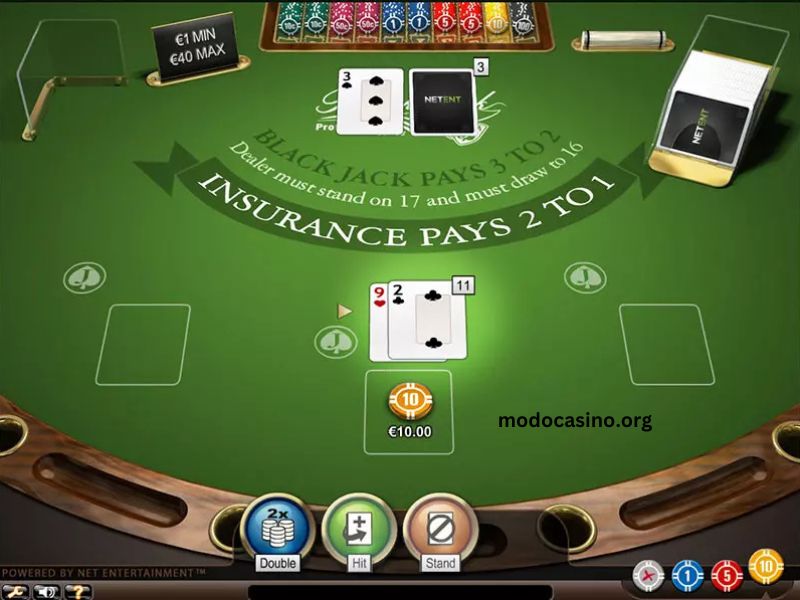Double Down Mean in Blackjackis one of the most popular casino games in the world, known for its blend of strategy, skill, and luck. Whether you’re playing at a physical casino or online, one of the most critical and strategic moves you can make is to “double down.” This phrase often confuses new players, but understanding what it means and how to use it effectively can significantly improve your chances of winning.
In this article, we’ll explain what “double down” means in blackjack, when and why you should consider using this strategy, and how it impacts the overall outcome of your game. By the end of this guide, you’ll have a comprehensive understanding of this crucial concept and how to apply it to your blackjack gameplay.
What Does “Double Down Mean in Blackjack?
“Double down” is a term used in blackjack to describe a strategic move where you double your original bet in exchange for committing to stand after receiving exactly one more card. Essentially, when you double down, you are taking a calculated risk in hopes of increasing your potential winnings. The reason it is called “double down” is that you are “doubling” your original wager while “doubling down” on the hand’s success.
For example, if you start with a hand valued at 8 and your initial bet is $10, you can choose to double down. In doing so, you’ll add another $10 to your bet, making your total wager $20. Then, you’ll receive only one additional card, and you must stand after that. The goal is to maximize your return on a hand that you believe has a high probability of winning with just one more card.
When Can You Double Down Mean in Blackjack?
In most blackjack games, you can only double down under specific conditions. These include:
- Initial Hand: You can only double down on your initial two-card hand. After receiving your first two cards, you’re allowed to decide if doubling down is a good strategy.
- Total Hand Value: The most common rule allows you to double down when your hand totals between 9 and 11. The reasoning is simple: you’re more likely to improve your hand with one additional card, and these totals give you the best chances of hitting 21 or a strong hand.
- Dealer’s Upcard: The dealer’s face-up card plays a critical role in your decision to double down. If the dealer is showing a weak card (such as 4, 5, or 6), you’re more likely to double down because there’s a greater chance the dealer will bust.
- Casino Rules: Some casinos have specific rules that allow or restrict doubling down. For instance, some may only permit doubling down on certain hand values (such as 9, 10, or 11), while others may allow doubling down on any two-card hand. Always familiarize yourself with the rules of the casino or blackjack table you’re playing at.
How Does Double Down Mean in Blackjack?
Doubling down works by increasing your stake in the hand for a potential higher reward. Here’s a step-by-step breakdown of how the process works:
- Initial Hand: You’re dealt your first two cards.
- Evaluate the Situation: After looking at your cards and the dealer’s face-up card, you decide whether to double down based on the strength of your hand.
- Double the Bet: If you choose to double down, you place an additional bet equal to your original wager.
- Receive One More Card: After doubling down, you’ll receive exactly one more card. You cannot take additional hits after this card.
- Stand: Once you receive your third card, you must stand. You cannot request any more cards, and your hand is final.
The key to doubling down successfully lies in assessing the odds and understanding when it is most advantageous to double your stake. It’s a risk that can lead to larger payouts, but it’s important to apply the strategy wisely.
Why Should You Double Down Mean in Blackjack?
Doubling down is not a random or impulsive decision. Successful blackjack players use this strategy to take advantage of favorable situations and increase their expected value (EV). Here are some key reasons why doubling down can be beneficial:
- Maximizing Potential Winnings: The main reason to double down is to increase the size of your potential winnings. If your hand is likely to improve with one more card, doubling down increases your payout while minimizing the risk of taking multiple hits.
- Taking Advantage of Weak Dealer Upcards: If the dealer has a weak upcard (4, 5, or 6), they are more likely to bust. In these situations, doubling down offers the chance to capitalize on the dealer’s vulnerability and improve your odds of winning.
- Favorable Odds for Certain Hand Totals: Certain hands, like a total of 11, have better odds of getting a high-value card on the next hit. For example, a hand with 11 has a high probability of landing a 10-point card (like a 10, Jack, Queen, or King), which would bring your hand value to 21.
- Psychological Advantage: Doubling down can put pressure on your opponents, especially if you’re playing in a live casino setting. It signals confidence in your hand and may influence how the dealer and other players respond.
When Should You Double Down Mean in Blackjack?
While doubling down can be a highly rewarding move, it is not always appropriate. Here are some common scenarios when it makes sense to double down:
- When Your Hand Total is 11: A hand total of 11 is one of the best situations for doubling down. With a 10-point card being a significant probability, doubling down gives you a strong chance of hitting 21.
- When Your Hand Total is 10: If your hand totals 10 and the dealer shows a weak card (like 4, 5, or 6), doubling down is a great option. This is because you’re more likely to get a high-value card, and the dealer is in a position to bust.
- When Your Hand Total is 9: If you have a hand total of 9, especially against a dealer’s weak upcard, doubling down can be a good strategy. A 9 offers decent chances of hitting a strong hand, and doubling down in this situation increases your reward.
- Against a Weak Dealer Card: Always consider the dealer’s upcard. If the dealer is showing a 4, 5, or 6 (cards commonly associated with busts), it’s wise to double down when you have a favorable hand. The reasoning is that the dealer is more likely to bust, and your chances of winning increase.
- When You Feel Confident in Your Hand: If your initial two cards create a strong starting point for a potential high hand, doubling down becomes a smart decision. However, if you’re unsure about your chances, it’s often safer to stick with your initial bet.
Risks of Double Down Mean in Blackjack
While doubling down can be a profitable move, it’s not without its risks. Here are some factors to consider:
- Increased Risk of Losing: By doubling your bet, you’re putting more money on the line. If you receive a low-value card or a card that doesn’t improve your hand, you could lose more than you originally wagered.
- Limiting Flexibility: After doubling down, you are committed to standing after your next card. This means you lose the flexibility to hit multiple times, which could potentially improve your hand.
- Not Always Available: Depending on the casino’s house rules, you may not always be able to double down. Be sure to check the rules before deciding to make this move.
How to Use Double Down Mean in Blackjack
In online blackjack, the mechanics of doubling down are the same as in traditional Double Down Mean in Blackjack. However, there are some unique features to be aware of:
- Virtual Tables: Many online casinos offer virtual blackjack tables, where you can practice your strategy without the pressure of live players. This can be a great way to refine your decision-making on when to double down.
- Bonuses and Promotions: Some online casinos offer special promotions or bonuses that enhance your doubling down opportunities. Look for these deals, as they can increase your potential return.
- Mobile Blackjack: Mobile platforms often feature easy-to-use interfaces for doubling down. You can quickly select the “double down” option when playing on your smartphone or tablet.
Conclusion
Understanding the concept of “double down” is crucial to becoming a skilled blackjack player. By strategically choosing when to double your bet, you can maximize your chances of winning and increase your overall profitability. Remember that this move should not be made impulsively but rather based on the strength of your hand, the dealer’s upcard, and your understanding of the odds.
Doubling down works best in favorable situations, such as when your hand totals 9, 10, or 11, and when the dealer shows a weak upcard. However, it’s essential to be aware of the risks and limitations, including the fact that you are committing additional money to the hand with no guarantee of success.
Whether you’re a beginner or an experienced player, mastering the art of doubling down is a key component of an effective blackjack strategy. So, the next time you sit down at the blackjack table, remember to keep this powerful move in your arsenal to increase your chances of walking away with a win.




